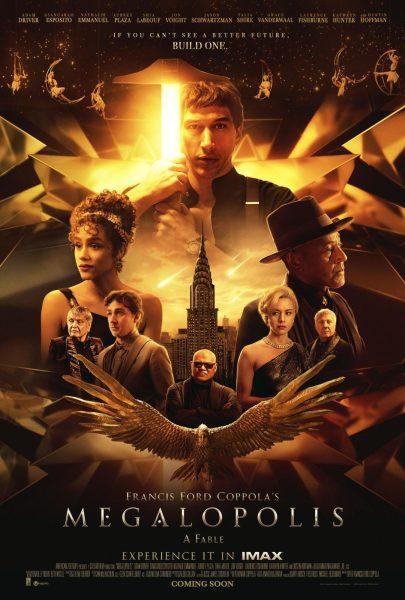
If you haven’t heard about “Megalopolis,” you aren’t alone. The film has been out for weeks and it has had some of the worst distribution a film of this budget has ever had. “Megalopolis” is Francis Ford Coppola’s most recent film, who is best known for films such as “The Godfather,” “Apocalypse Now,” and “The Outsiders.” To have such a well-respected director release a film that is a so-called “Megaflopolis,” it makes you wonder, what went wrong?
“Megalopolis” has been in the workings since the early ‘80s. The film takes place in future New York and follows Cesar Catilina, an architect, who has a vision for a new way of civilization, which he tries to make a reality. When Coppola attempted to produce the film in 1989, studio executives shut it down due to initial box office failures of his previous films. A little over a decade later, Coppola again attempted to bring Megalopolis to the big screen, but production was again canceled after 9/11. Then after 20 years, Coppola sold his wine company — for around $120 million — to help financially aid the production of the film before its release on Sept. 27, 2024.
Coppola funded the entire film with his own money, meaning the film was not produced through any big name production companies — which may be one of the reasons the film was not taken well. Hollywood did not profit off of this film at all, and lots of critics who work in Hollywood were not quick to defend the film. But as for the film itself, the audience seems to be divided.
Miles Dixon, an indie producer and production assistant formerly based in Portland, highlights some of the privileges that came with the self-production of the film. “The writing and acting felt really free and open, like there were genuinely no wrong ideas. There was a feeling I got, like this could go anywhere … They were very open to crazy ideas and trying to push boundaries,” noted Dixon. These can also be the same reasons that people might hate the film. Blake Hawes, a production and directing assistant in NY, describes Megalopolis with a metaphor: “It’s like being under a waterfall of cinema, you can’t even stand under it because you’re just gonna get swept away immediately … [It’s like] pounding non-stop onto your brain, body, mind, and soul.”
Both of these opinions are interesting because they can both be shed in a positive and negative light. For instance, when talking to Hawes — someone who had trouble with the amount of experimental ideas put in the film — I found that we actually agreed on quite a few things surrounding how the film was presented. We found the same things ridiculous and the same things over the top. The only difference was whether or not we thought these aspects were worth the attention. Hawes did not.
The biggest misleading opinion that I’ve heard about this film is that it isn’t for everyone, but what is for everyone? No film, show, book, or piece of art will appeal to everyone, and if you walk into this movie expecting it to be super controversial, it will be. The best way to see this movie, and any movie for that matter, is to have no expectations. See the film for what it is, not for what people tell you it is. The movie may have been an “experimental film” but I would take that with a grain of salt. If a film isn’t “experimental,” I don’t want to see it. If we get exposed to the same ideas and concepts every time we watch something, we won’t learn anything. It’s a good thing to be uncomfortable, or to be confused, that’s what makes you critically think. This kind of film is of a dying breed; so many movies are influenced by money, that it’s rare when we get a true original idea on the big screen. So if your heart is up for it, you can come to terms with your own “Megalopolis.”



































Lawrence Krikorian • Dec 26, 2024 at 4:32 pm
How does it compare to “Brazil,” or does it?